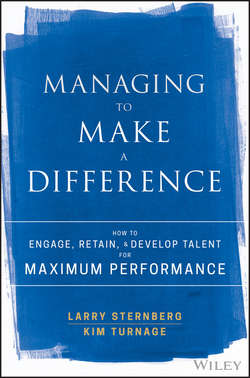Читать книгу Managing to Make a Difference - Sternberg Larry - Страница 10
На сайте Литреса книга снята с продажи.
SECTION I
CULTIVATE POSITIVERELATIONSHIPS
CHAPTER 4
ACCEPT PEOPLE AS THEY ARE
ОглавлениеAccepting people as they are – not asking them to change – is the most important aspect of cultivating positive relationships. In fact, this is the most important chapter in the book. This chapter can change your life.
Bill's Lesson Learned
A friend, Bill Kerrey, tells this story. His daughter did not keep her room neat and tidy and Bill was determined to help her change that.
Every weekday he would drive her home from school. The drive was tense because they both knew that when they got home, he would look at her room right away. Every day it was messy, and every day the evening went downhill from there. He tried every technique in the book (and some that were not in the book) to motivate her to change. Nothing worked.
One day he realized that his focus on keeping her room neat was damaging their relationship, and he realized that his relationship with his daughter was way more important to him than a clean room.
That day on the drive home he asked her about her day. When they got home he did not inspect her room. He just closed the door. He figured out that if he did not see it, it would not bother him. So he just quit focusing on her room, and he quit asking her to change. He accepted her as she was.
Bill reports that his relationship with his daughter improved overnight.
Dr. William E. Hall defined a “life theme” as a pattern of thoughts, feelings, and behaviors that is persistent over time. Every time you describe someone, you are naming themes: cheerful, thoughtful, lazy, organized, courageous – get the picture? These descriptions help us predict the behaviors we are likely to observe in others.
If you want to understand just how persistent themes are, think about your most recent school reunion (or some similar event). Did not you see the same themes you saw when you knew those people years ago? The class clown is still the class clown. The gossips still gossip. The introverts are still quiet. Themes persist over time and are particularly resistant to change.
Despite the fact that people tend not to change, we are quite cavalier about asking people to change anyway. We do this all the time in performance evaluations and in 360 feedback. Do any of these examples sound familiar?
1. Do not be so sensitive.
2. You need to be more organized.
3. You need to be more detail oriented.
4. You do not demonstrate a sense of urgency.
5. You are late to meetings all the time. This has to change.
6. You need to be more assertive.
7. You are too much of a perfectionist.
We drastically underestimate how difficult it is to change these deeply ingrained patterns.
Marry As Is; If You Get a Change, It's a Bonus
A seminar participant once asked, “Do you mean my husband is never going to change?” In response to the question, “Can you tell me more?” she explained.
“I'm very goal oriented and my husband is very laid back – a go-with-the-flow kind of guy. Last Saturday, he left the house at 10:00 AM to run some errands. He had six things he was going to do. He returned home at 2:00 PM and he had done only two! So I said to him, ‘What about the other four?’ ‘Don't worry,’ he replied, ‘I'll get them another time.’ Do you mean to tell me that is never going to change?”
I asked, “Suppose it does not change? Would you still love him? Would you still want to remain married to him?”
“Of course,” she replied, “but what can I do about this?”
“Get off his back! Quit asking him to change. Accept him as he is.”
Everyone you know has people in their lives who are trying to help them improve. But they are doing it by focusing on eliminating flaws and remediating weaknesses. Everyone has plenty of help on that agenda. You have the opportunity to be one of the few people who focus on what is right about a person rather than what is wrong.
Lesson
Marry as is. If you get a change it is a bonus. When you quit asking people to change, you will change your relationships. And when you change your relationships you will change your life.
Of course this applies not only to your personal relationships, but also to your professional ones, and particularly to your relationships with the people you manage.
Experiment: Quit Asking People to Change
1. Identify two people you are asking to change – one in your personal life and one in your professional life.
2. Just quit asking them to change. Accept them as they are.
3. Notice what happens to your relationship.
